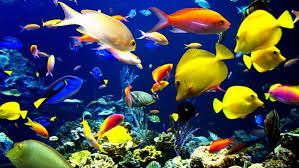Healthy Seas, Happy People: Joey Issa Likes What Makes SenseA Story by Sally ShivA successful entrepreneur, Joe Issa, who is believed to know more than most what makes sense in business and philanthropy, now adds the environment on his list, as he supports the slogan: “Healthy Sea
Commenting
on an article of the same title which shames humans for littering the sea with
garbage and destroying critical fish habitats, Issa says “it makes sense to
keep the sea healthy so that we can continue to exploit its resources much to
our pleasure and happiness.”
That
the resources of the sea are depleting rapidly by human actions, Issa remarked,
“You can’t argue against that; the evidence is glaring all along our coastlines
and harbour, which serve as repositories for garbage such as plastic bottles
and Styrofoam washed away by rivers and gullies whenever it rains.”
In
addition to garbage, humans are also said to be constantly polluting the sea
with untreated or partially treated sewage, industrial effluent, ship
pollution, or the runoff of chemicals used in agriculture. As much as 40 percent of the world’s oceans is believed to be heavily affected by human
activities including pollution, depleted fisheries, and loss of coastal
habitats.
“It’s
common sense that if we do not restore the health of the sea by proper disposal
of garbage and cleaning and replenishing our coral reefs and mangroves, sooner
or later we won’t have a fish to put on the table and a beach to go to, and we
won’t be too happy about that,” says Issa.
In
agreeing with the article that “the beach is a constant lure for Jamaicans
in all walks of life…an escape, the epitome of relaxation and quite simply, the
sea makes us happy”, Issa warns, however, that “soon, this will no longer be
the case when the sea becomes too polluted to swim in and harbour marine life.”
Noting
that the sea has been a source of livelihood for billions of people throughout
the world, Issa argues that “if we continue to take from the sea without giving
back to it, eventually, it will be unable to sustain life as we know it.”
According
to the United Nations, it is the oceans �" their temperature, chemistry,
currents and life �" that drive the global systems that make it possible to live
on earth, stating that “our rainwater, drinking water, weather, climate,
coastlines, much of our food, and even the oxygen in the air we breathe, are
all ultimately provided and regulated by the sea.”
While
lamenting the senseless human actions that are causing the earth’s temperature
and sea level to rise, Issa finds some comfort in the oceans’ ability to
counteract them, contending that “it’s a good thing that the oceans are able to
absorb some 30 percent of the carbon
dioxide which we produced, otherwise the impacts of global warming would have
been more pronounced today.”
In
acknowledging the might of the world’s oceans Issa invokes UN data which show
that they cover three-quarters of the
Earth’s surface, contain 97 percent of
the Earth’s water, and represent 99 percent
of the living space on the planet by volume.
It
said over three billion people depend on marine and coastal biodiversity for
their livelihoods and estimated the global market value of marine and coastal
resources and industries at $3 trillion per year or about five per cent of
global gross domestic product (GDP).
Mindful
that the oceans and seas have been vital conduits for trade and transportation throughout
history, Issa supports the suggestion that “careful management of this
essential global resource is a key feature of a sustainable future.” © 2017 Sally Shiv |
Stats
77 Views
Added on April 4, 2017 Last Updated on April 4, 2017 Tags: Joey Issa, Joey Issa Jamaica, Joe Issa, Joe Issa Jamaica, Joseph Issa, Joseph Issa Jamaica, Environment, marine and coastal resources, world’s oceans, polluted, Healthy Seas, Happy People. Author
|
 A successful
A successful

 Flag Writing
Flag Writing